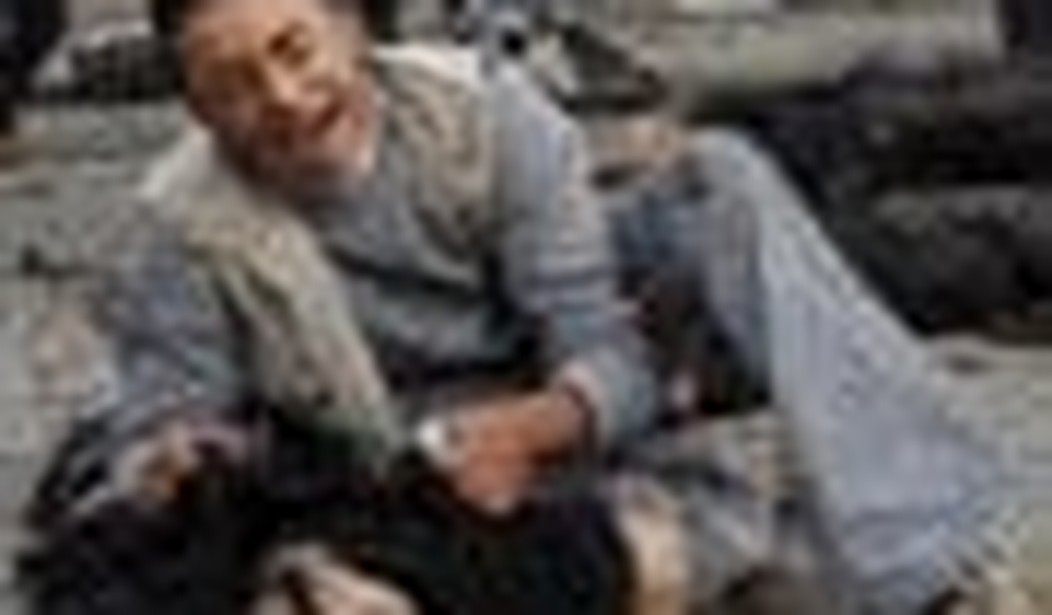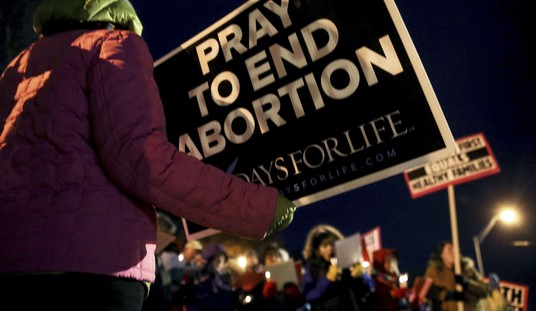At about 1:10 on Sunday, December 28, 2008, the BBC anchor Peter Dobbie found out, along with his audience, that there were 40 Egyptian ambulances ready to evacuate wounded, and lorries full of medical goods sent by Qatar to restock Gazan hospitals, waiting at the border crossing in Egypt. (According to another source there were also 50 Egyptian doctors ready to go into the Strip to help.) Since Dobbie and his audience had heard the repeated complaint from the people in Gaza that the hospitals were overwhelmed by the injured and desperately lacking in supplies, one would have expected the border to be full of purposeful activity. Instead, nothing was happening. The Gazan side lay silent.
A real journalist, someone with a smell for revealing anomalies, would have immediately recognized this as an important story to follow up on. After all, Dobbie had not hesitated to interrupt and challenge Israeli spokesmen on precisely the issues at stake: the disproportion between Israeli-caused fatalities and Israeli-suffered fatalities, the inevitable suffering of innocent civilians when such a bombing campaign takes place in so densely populated an area. “The math doesn’t work,” said Dobbie, implying what commentators emphasized elsewhere — the “disproportionate use of force” the Israelis were employing.
So here was a perfect issue with which to challenge Hamas spokesmen: If they were so distraught at the loss of life of their own people, why didn’t they take care of them? What on earth would possess Hamas not to avail themselves of what they pleadingly told the world they so desperately needed? As the honest and courageous Egyptian blogger Sandmonkey put it, “My head hurts.”
Alas, the BBC did nothing of the sort. The next six hours saw nothing but canned footage repeating Palestinian complaints, voiced not only by Hamas spokesmen and BBC reporters, but UN officials like Chris Gunning and human rights advocates, and, of course, others in the Western MSM.
Indeed, one might characterize the basic “frame” of the MSM Gaza story: Israeli Goliath creates Palestinian David humanitarian crisis. Four out of five stories tell this story in one way or another, including the interviews with Israeli officials asking them to justify their deed. (Ironically, that’s about the ratio of Hamas men to civilian casualties in the first days.)
Too bad. Had the BBC behaved like real journalists instead of parroting Palestinian narratives, they might have taken the “golden” (read excremental) thread that leads out of the labyrinth and straight to the “real story.” That story, of course, is the dreadful Palestinian strategy, taken to new heights by Hamas in the early 21st century — play the victim card at any cost. In this case, create a genuine humanitarian crisis.
Hamas initially offered two reasons for not allowing the wounded out: 1) the roads were too dangerous to venture out on, and 2) they were composing a list of the wounded. Both of these are just the kind of lame excuse that, had they been voiced by Israeli spokesmen, the BBC interviewers would have jumped all over them. Israelis have targeted only military and government sites; no ambulances have been hit and the roads are full of cars bringing wounded (past cameras) to hospitals. As for making up a list of 600 wounded before evacuating any, surely you must be kidding.
Then Hamas spokesman Fawzi Barhoum, speaking to Khaled Abu Toameh, denied the Egyptian allegation that Hamas was to blame, “claiming that many of the wounded rejected an Egyptian offer to receive medical treatment in Cairo in protest against Cairo’s ‘support’ for the IDF operation. He accused the Egyptians of taking part in the ‘siege’ on the Gaza Strip by refusing to reopen the Rafah crossing.” Hamas even delivered before the cameras a group of “family members” who claimed they refused to let their wounded go because of their anger at Egypt’s behavior. On the contrary, as Ma’an News Agency reported, Hamas would allow no passage of wounded until the border was completely open.
More hollow claims. Gazans don’t hesitate to accept medical aid from the Israelis, the people who in their minds actually inflict the wounds. So why not take Egyptian aid? And of the 600 wounded (according to Palestinian sources) all of them, suffering in a ludicrously crowded and understaffed hospital, refused to go to Egypt?
Although the reasons are hollow, they do tell us about Hamas priorities, and the overwhelming message of this refusal is that helping their own civilians survive ranks very low on their scale, well below revenge and public relations concerns. Indeed, as with Israel, so with Egypt: they hold their people hostage to maximalist demands.
Some say Hamas doesn’t care about their people. The evidence suggests far worse. They actively seek the victimization of their own people. Indeed, the enormous resources they have expended on the constant, if largely ineffective, barrage of rockets on Israeli civilians is actually quite staggering. Not only have they lavished much of their meager resources to this vicious and gratuitous activity, but, as a result of those attacks, guaranteed that their borders would be closed and their people would continue to suffer — hostages to their hatred. Thus, the phony excuses offered for the border snafu disguise something far more sinister: Hamas wants the crisis; they want civilians dying dramatically in wretched hospitals.
On the face of it, it seems absurd that a government would actively victimize its own people. What advantage in making an already miserable people suffer even more? There are two major explanations here. First, Hamas, like many other Palestinian groups, is addicted to violence against Israel. Anything they can do, no matter how small, to make Israelis suffer, they will do, whatever the cost. As the Israeli satirical program, Eretz Nehederet (like Saturday Night Live) had Hamas leader al-Zahar explain to Ehud Barak, “Kassams are like cigarettes … you can’t just quit all at once.” Thus, they have spent virtually all their resources on smuggling and firing weapons while their people suffer their government’s neglect and Israeli retaliatory blockades.
But the second explanation is far more disturbing, because it involves the media. Hamas only gains a real advantage to having Palestinians suffer if they, who do so much to inflict that suffering, can blame it on Israel. It would be absurd for Hamas to stand in front of the world and say, “Look at how much we make our own people suffer; join us in hating Israel.” So the game is intensely hypocritical. It depends on getting public opinion, both in the Arab-Muslim world and in the West, to accept a scapegoating narrative — the Palestinian Guernica — that deflects responsibility.
And the pathetic thing is that it works. In the Arab world gory images of dead and wounded play round the clock, inciting furious demonstrations. But, alas, it also works in the West. And it works primarily because of the behavior of the Western media, who systematically frame the conflict in terms of the Israeli Goliath and the Palestinian David, who do not hesitate to challenge Israeli spokesmen, interrupt them, contradict them — but who fail to do anything of the sort with their Arab interlocutors.
Thus, for hours and days after the story of idling ambulances first broke, BBC never mentioned it. On the contrary, they continued to run footage of complaints from Gaza about the terrible condition of the hospitals and calls for international intervention to save the poor people of Gaza. This enables the worst kind of hypocrisy, of demopathic behavior — accuse others of violations of a humanitarian code which you flout, not only with your enemies, but with your own people.
The next day, when Christian Fraser finally got some more airtime again, the border was open even if sluggish. No mention of the earlier, revealing incident ensued. Kristy Lang, the anchor, begins with a leading question that does not allow for much elucidation:
KL: “I’m with BBC correspondent Christian Fraser who’s at the Rafah crossing between Egypt and Gaza. This, just to remind you, this is a crossing that has been closed for the last few days. They are letting some people through, isn’t that right Christian?”
CF: “Yes, they’re letting across the most seriously injured; they’ve just let 10 in the past several hours, up to about 40 in the last couple of days. These are the most seriously injured.”
Meanwhile, the headliner at the bottom of the screen reads: “Palestinian medical officials: 10 killed in latest attacks. … Palestinian medics say 360 people have died. … UN says 62 women and children killed.”
Nor is this kind of discreet silence passed over Hamas behavior restricted to the Beeb. CNN didn’t even mention the story, despite their anchors citing material from the wire services, where all the major ones covered it. Similarly, when a young girl described waking up in bed next to her dead sisters and then blamed it on Hamas — “Hamas is the cause, in the first place, of all wars” — ABC ran the footage without including the final, devastating comment. Why? Because it didn’t make sense to them? Because it violated the “grand narrative” and would only confuse the public?
The moral irony here is almost unbearable. While Hamas systematically and deliberately victimizes its people in order to court Western support in outrage at the suffering of her people, the media get indignant about how Israel makes the Palestinians suffer. The very values that underlie the media’s rebuke — the value of human life — are values that Israel and the Western media share and Hamas has contempt for. And in so doing, they make Hamas’ revolting calculus of inflicting suffering on their own people pay off.
And in so doing, the media not only enable the greatest victimizers of the Palestinians; they also fuel the hate and rage that increasingly fills the streets not only of the Arab and Muslim world, but the West as well, even among Jews.
To take a typical example of someone whose outrage disproportionately exceeds his understanding, take Chris Hedges’ latest:
Can anyone who is following the Israeli air attacks on Gaza — the buildings blown to rubble, the children killed on their way to school, the long rows of mutilated corpses, the wailing mothers and wives, the crowds of terrified Palestinians not knowing where to flee, the hospitals so overburdened and out of supplies they cannot treat the wounded, and our studied, callous indifference to this widespread human suffering — wonder why we are hated?
Are they fools or knaves? Or are they knaves for being such fools?









Join the conversation as a VIP Member